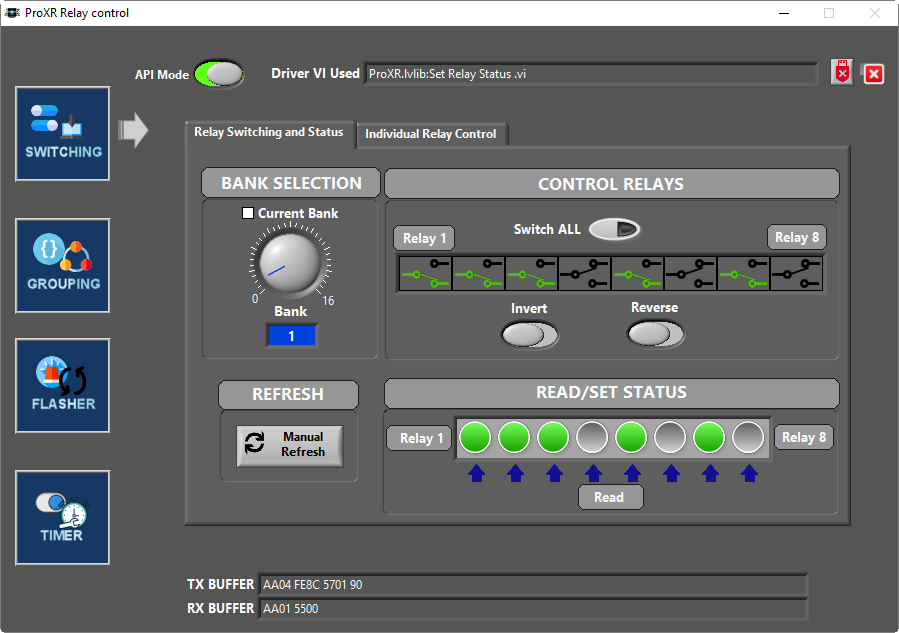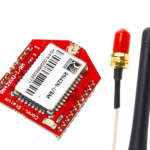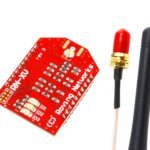
- Order number: NCD-ZAD1232PROXR
- Manufacturer product ID: ZAD1232PROXR
USB ProXR Enhanced with A/D
USB Virtual COM Relay Controller with 8-Channels of Analog to Digital Conversion and XR Expansion Port
About USB:
Our USB ProXR Series Relay Controllers make it easier than ever to add computer controlled switching to your most demanding computer control applications. Simply connect to your computer and this controller mounts as a Virtual COM Port on your PC, allowing easy programming from any language that supports serial communications.
This ProXR series controller connects to the USB port of your computer and requires a 12VDC Power Supply. Once powered up, the relay controller waits for a command. A command consists of a few bytes of data. Usually between 2 and 6 bytes. Once the command has been received, the controller processes the command, and sends you back ASCII character code 85 to signal the completion of your command.
ZUSB Modules
This board is equipped with a ZUSB Module. The ZUSB communications module adds USB communications to all NCD devices equipped to accept modular wireless communication modules. The ZUSB is powered from the USB port of your computer and includes a 6′ USB Cable. The ZUSB is available in three varieties:
About ProXR:
With all the control and backward/forward compatibility you have come to expect from the ProXR series command set, this controller allow you to send simple commands to activate relays, read the status of relays, activate up to 16 relay timers, and control up to 256 total relays using the XR Expansion Port. All relays are electronically latched, simply send a command to turn the relay on, send a different command to turn the relay off.
You can send commands to activate relays, deactivate relays, control all the relays at one time, plus you can send commands that tell a relay to turn on for a few seconds, minutes, or hours. You can assign 16 timers to any of the 256 relays, and set the timers to go off after the duration has expired.
A/D Conversion
Analog to Digital Conversion allows you to read voltage levels from 0-5 volts using 8-bit or 12-bit resolution. This is particularly useful for reading temperature sensors (one temperature sensor is built into the board, shared with analog input number 8). A/D Inputs are also useful for reading light level sensors, thermocouples, switch closures, or just about any other kind of sensor you can think of. Built-In Pull-Up/Down Resistors keep the inputs quiet.
Updated Communication Technologies
This product has been updated to support many communication technologies. Please reference the quick start guide for each of the associated communication technologies, as they generally all work as protocol converters to convert data to serial communications at 115.2K baud. Please choose from any of the communication technologies below:
ProXR Series Industrial Relay Controllers
NCD has been in business since 1995, and we created the world’s first commercially available relay controller. ProXR Industrial controllers are the best controllers on the market with over 10 years of production history and a 5-Year Repair or Replace Warranty to back it up! There are many reasons that make ProXR the leading relay control solution. Let’s take a look at why ProXR controllers are unique, and why industry has chosen NCD controllers for so many years:
ProXR Reliability
The firmware we designed for ProXR series controllers is ultra-stable. Our CPU uses hardware interrupts to manage communications while processing a wide range of background tasks, such as 16 relay timers, 16 relay flashers, data parsing, and garbage cleanup. ProXR controllers will never “drop” commands, even in the most demanding environments. We use a hardware watchdog timer, built into our CPU. The watchdog timer acts as a supervisor, capable of rebooting the CPU should anything go wrong so you never loose communications. The current CPU is more powerful, more feature packed, and more stable than any other controller on the market. ProXR controllers were designed to operate non-stop 24/7 from 0 to 85C.
ProXR Features
ProXR controllers can take control of relays in ways you may have never imagined. Of course you can turn relays on, or off, or toggle the current state of the relays. It’s also easy to read the status of individual relays, relay banks, or all relays on the controller. These are basic functions every relay controller should support. ProXR relay controllers have many features you may not expect. For instance, ProXR controllers support 16 timers that run in the background. Each timer can activate a relay for up to 255 Hours, 255 Minutes, and 255 seconds when activated. Activate 16 security lights using the timers and watch them all turn off at different times. ProXR controllers also support 16 flashers, allowing up to 16 relays to be automatically cycle on and off in the background until the flasher is canceled. Relay grouping commands allow ProXR controllers to simulate large expensive relays using low-cost relays. Grouping commands are used to activate a master relay plus a few of it’s neighbors simultaneously, allowing simulation of DPDT, 3PDT, 4PDT, 5PDT, 6PDT, 7PDT, and 8PDT relays using a low-cost 8-Channel SPDT relay controller.
Automatic and Manual Relay Refreshing
By default, ProXR controllers automatically update the status of relays every time you send a command. This feature may be enable or disabled. When disable, users have the ability to configure the relay memory without actually switching relays. Once all the memory is configured, simply send the Relay Refresh command and all relays will refresh simultaneously. This is particularly useful in applications that may require you to configure the on/off state of each relay and switch all relays at the exact same time. ProXR will remember your refresh settings every time it powers up. And while we are on the subject of power-up, ProXR relay controllers do not click when power is first applied. This alone is one of the biggest reasons industry has chosen ProXR over the competition.
XR Expansion Port
ProXR relay controllers are equipped with a XR Relay Expansion Port. The XR Port allows you to add more relays to your controller as your needs expands. Combine mechanical and solid-state relay expansion controllers in any combination to accomplish your automation requirements. We manufacture SPST, SPDT, and DPDT expansion solutions, available in 4, 8, 16, 24, and 32 channel versions. ProXR relay controllers support up to 256 relays in firmware; however, expanding over 128 relays may not be possible if the cable length is too long.
ProXR Perks
There’s a lot of little things we did to make ProXR special. We created Base Station Software so you can learn to use ProXR controllers using a Windows 8 or 10 PC. Base Station supports all communication technologies and teaches you what bytes to send to your controller so you don’t have to hunt down the manual every time you want to use a new function. Simply copy and paste the communication bytes from the Base Station User Interface into your favorite programming language. Base Station will demonstrate the engineering behind ProXR series controllers, but if you want a preview, just take a look at the ProXR Quick Start Guide in the Resources section. On-line videos walk you through all the major features. ProXR controllers have a 5 year warranty and a operational life expectancy exceeding 10 years. We built ProXR controllers to last. We are committed to up-gradable hardware, not disposable hardware. We use the best relays, the best communication technologies, and we have the best support in the industry. We can help you with all of your relay control needs, no matter how complex!
LabVIEW Relay Control Support Coming in 2018
We are pleased to announce that official LabVIEW relay control drivers will be supported beginning January of 2018. This is our first official release of LabVIEW drivers for ProXR series Relay controllers! We are finalizing the drivers and resources now. We will post in the News section as well as the Learn section of our site as soon as we are ready.

LabVIEW ProXR Relay Drivers
802.15.4 Long-Range Wireless
Use 802.15.4 Communications if you require industrial strength long-range wireless communications. 802.15.4 is a point-to-point wireless standard, allowing fast communications. The wireless protocol acts as a long-distance wireless serial port, allowing wireless operation with no modification to software.

900HP-S3B Industrial Wireless Mesh
Long-Range Wireless Mesh networking is our favorite of all wireless communication technologies. This communication module will hop data from one location to another to reach its intended destination. Data hopping is a integrated feature of this communication technology, users do not need to do anything other than make sure wireless modules stay within hopping range of each other. We use the Digi 900HP-S3B module in our products, as this is the best the industry has to offer. With a 2 mile range between modules and up to 8 hops, it is possible to cover 16 miles of wireless territory using this technology. Using high-gain antennas, this module is capable of communicating to a remote module up to 28 miles away.

Bluetooth
Bluetooth is a easy way to add wireless communications to the NCD Industrial product line. The Bluetooth communications option acts as a transparent serial port between your computer and NCD devices. Simply pair the device with your computer and access the device through the COM port that is associated with the Bluetooth communications module.
 | E3C DropNetE3C DropNet is our own communication technology, which allows up to 256 devices to share a single 3-wire data bus. Communication distances of over 1,000 feet are achievable using repeater modules on the bus. E3C DropNet allows you to communicate to each of the 256 devices without data collisions, and is based on a modified RS-232 signal. DropNet is very similar to RS-485, but the protocols are easier to implement with more nodes, but at lower communication speeds. Users have many options for a head communication technology. For instance, a USB head will convert a USB interface to the DropNet 3-Wire bus and allow all 256 devices to communicate to the USB port of your computer. Optionally, the USB interface may be replaced with RS-232, Ethernet, WiFi, Bluetooth, or Industrial Wireless technologies. Communication speeds of 115.2K Baud are possible, but slower communication speeds means longer distances. |

Ethernet TCP/IP
Control NCD devices using standard Ethernet TCP/IP communications. Simply open a socket and send and receive TCP/IP data to control our devices. Our Ethernet TCP/IP Communication modules feature the Lantronix XPort communications module, the best in the industry. The Lantronix XPort module is an industrial workhorse that we have trusted for many years.

Ethernet Web-i WebRelay Communications
NCD Controllers equipped with a Web-i WebRelay interface may be controlled from a built-in web page. The NCD WebRelay interface module feature a Ethernet connection, allowing control of our devices from anywhere in the world using a web browser.

RS-232 Serial
NCD RS-232 Serial Communication modules make it easy to integrate the worlds most prolific communication standard. Easily interface to desktop PCs and laptops for easy control via standard serial commands. Most NCD devices typically default to 115.2K Baud; however, older low-cost devices implement 9600 baud data rate as the predominate standard.

USB
Our USB interface module makes it easy to control our devices using the USB port. Simply plug into any available USB port and start controlling our devices using standard serial commands. NCD USB Interface modules feature genuine FTDI USB to Serial Converter Chips, the very best in the industry.

WiFi TCP/IP
Control NCD devices using standard WiFi TCP/IP communications. Simply open a socket and send and receive TCP/IP data to control our devices. NCD WiFi communication modules are manufactured by Microchip, the world leader in microcontrollers.

ZigBee® Wireless
ZigBee® wireless communications is a popular standard among our customers. The wireless protocol acts as a long-distance wireless serial port, allowing wireless operation with no modification to software.
- Do you have any questions concerning this product?
- AD1216 Analog to Digital Converter Quick Start Guide
- ProXR Quick Start Guide
- API Codec Quick Start Guide
- Base Station Quick Start Guide
- NCD Component Library Quick Start Guide
- Scratchpad Memory Quick Start Guide
- Deprecated Technologies
- EEPROM Memory Map Quick Start Guide
- Download NCD Base Station
- Official Repository
- Further products by NCD
